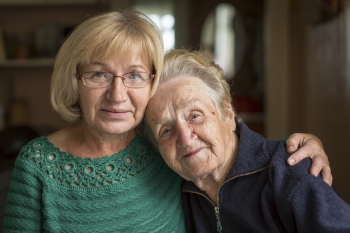Simple forgetfulness (the "missing keys") or delay or slowing in recalling names, dates, and events can be part of the normal process of aging.
Age related memory loss is often a normal part of aging, and if experienced, doesn't necessarily mean you or a love one has Alzheimer's. But since irreversible dementias can often present the same mild memory symptoms at first as less serious issues, it is not unusual for caretakers to be alert to any sign of memory loss in an aging loved one. It's difficult to know when there is cause for concern.
First Steps To Take
If your parent or loved one is experiencing memory loss, here
are the first steps to take and possible causes of memory loss in the
elderly parent.
1) Observe Carefully
Observing can be difficult, as the elderly often
try to cover up their diminishing memories. But keep a close eye on
the types of things being forgotten. Does your elderly loved one have
those little lapses in memory we all have-misplacing keys or glasses,
forgetting an appointment every so often-but just a little more
frequently than before? Or do they get lost in familiar neighborhoods,
forget the names of close friends or family members, or forget they
left the stove on? Some of these memory lapses are of more concern
than others.
2) See Your Doctor
The first thing that most caretakers think of in these situations is usually Alzheimer's disease. But this isn't necessarily the cause, and doctors will usually conduct diagnosis through a process of elimination that may include blood and urine tests, memory tests, or an MRI.
There are a
range of possible causes of memory loss in the elderly which include
the following:
Side Effects of Medication
A wide range of medications can affect memory. These include
anti-anxiety drugs, statins commonly taken for cholesterol,
antidepressants, beta-blockers, sleeping meds, and more. If your
parent is on any of these medications, it's important to discuss their
memory symptoms with the prescribing physician.
Vitamin B12
Deficiency
Vitamin B12 deficiency is rare, but it does occur-and when it does, it can cause memory issues. This disease causes the bone marrow to produce larger and fewer red blood cells than normal. In addition to memory issues, symptoms include fatigue, yellowish skin, headaches, balance problems, and tingling or numbness in the feet and hands.
Depression, stress, and anxiety
Can anxiety
and depression cause memory loss? It isn't unusual for
older people to have these problems, especially those coping with
social isolation and boredom, loss of mobility, or the death of a
spouse. Aging comes with big challenges that can cause extreme stress,
and this is often enough to affect memory.
Hydrocephalus (NPH)
Mild dementia is described as a loss of interest in daily activities, forgetfulness, difficulty dealing with routine tasks and short-term memory loss. NPH is one of the few treatable forms of dementia. Symptoms in addition to memory issues may include loss of bladder control and a distinctive shuffling walk.
Symptoms of Normal Pressure Hydrocephalus
Normal pressure hydrocephalus (NPH) is typically characterized by a triad of symptoms: gait disturbance or difficulty walking, mild dementia and impaired bladder control. These symptoms may occur individually and at different times and may vary in level of seriousness.
-
Mild dementia is described as a loss of interest in daily activities, forgetfulness, difficulty dealing with routine tasks and short-term memory loss. NPH is one of the few treatable forms of dementia.
-
Impairment in bladder control in mild cases is typically characterized by urinary frequency and urgency, and in severe cases is a complete loss of bladder control or urinary incontinence. Some people with NPH never display signs of bladder problems.
-
Gait disturbances range in severity from mild imbalance to the inability to stand or walk at all. Gait is often widebased, short-stepped, slow and shuffling. Gait disturbance is often the most pronounced symptom and the first to become apparent.
Brain Tumor
Brain tumors sound
terrifying-and in many cases they are-but some tumors are benign and
not life-threatening. These can cause memory problems as well as
problems with cognitive function and even personality. Other symptoms
include seizures, vomiting, and headaches. The first symptoms,
particularly in older adults, often look like dementia.
Subdural Hematomas
These are blood clots caused by bruising in the
brain. When they occur in the subdural area, between the surface of
the brain and the thin membrane around it, symptoms can look like
dementia. These are life-threatening; they are usually caused by
serous head trauma, but in elderly people they can also occur after
minor head injuries.
Thyroid
Disease
Either an overproduction
or underproduction of thyroid hormones can cause dementia-like
symptoms. Both can be detected with a blood test. An overactive
thyroid can be removed or destroyed, usually fixing the memory issues;
underproduction of these hormones is often treated with replacement
therapy, but this may not fix the dementia symptoms.
Alcoholism
Those who are severely alcoholic may become
thinking-impaired due to long-term malnutrition or decades of
overconsumption of alcohol. Abstinence can sometimes help restore
brain function.
Vascular Dementia
This problem arises from
insufficient blood supply to the brain. It's the result of a series of
tiny strokes that may go unnoticed, causing cumulative damage. The
symptoms include a marked and abrupt change in cognitive performance
as well as slurred speech, paralysis, and confusion. Usually those
with a history of cardiovascular disease or diabetes are particularly
at risk, as are those who have had a stroke before.
There are
a large number of diseases and conditions that can cause memory loss.
While some symptoms can be spotted ahead of time, it's best
to take your loved one to a doctor for a firm diagnosis. The earlier
your loved one gets to the doctor, the greater the chance for a
positive
outcome.
Related Articles:
- How to Choose an Alzheimer's Care Facility
- How to Pay for Memory Care
- What is Memory Care? Benefits of Memory Care Facilities
- Dementia and the Music Therapy Connection
- Signs & Symptoms of Sundowning
- The Montessori Method for Dementia Care
- Alzheimer's Risk Factors and Prevention
- Dementia vs. Alzheimer's Disease: What Is the Difference
- Aerobic Exercise and Dementia
- GPS Tracking Device's for Alzheimer's Patients
- Signs and Symptoms of Alzheimer's
Home | About | Articles | Resources | Site Map | Privacy Policy
Elder Options of Texas
Copyright 2001-2024
All Rights Reserved
DISCLAIMER: Links to other websites or references to products, services or publications do not imply the endorsement or approval of such websites, products, services or publications by Elder Options of Texas. The determination of the need for senior care services and the choice of a facility is an extremely important decision. Please make your own independent investigation.



